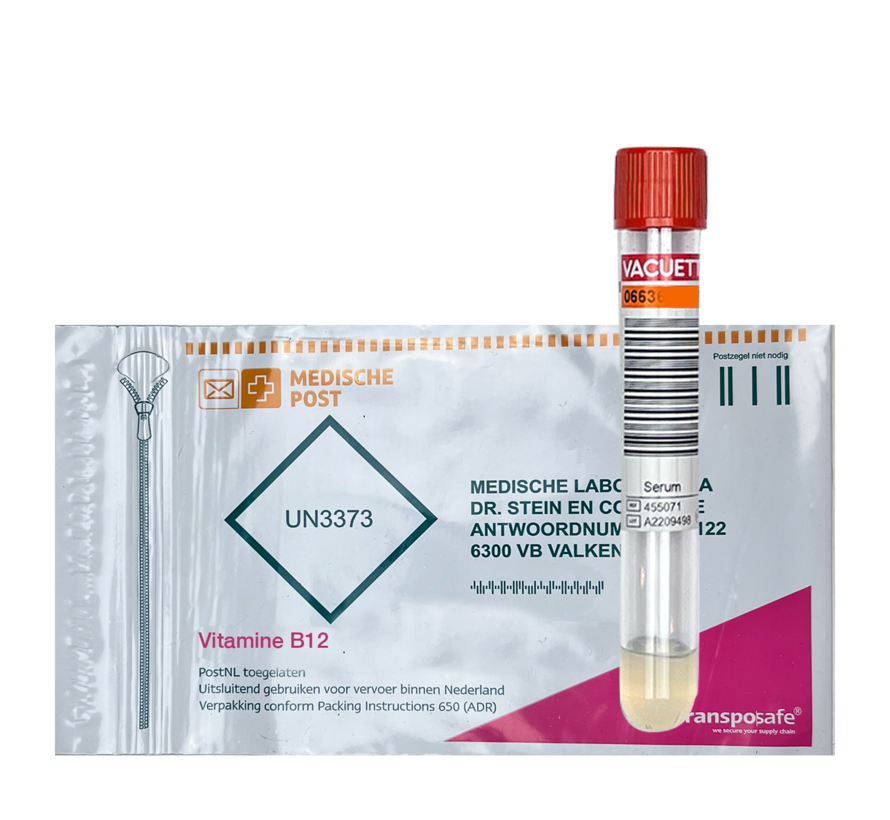Vitamin B12 deficiency
Standard Vitamin B12 (cyanocobalamin) test.
This blood test finds out if a vitamin B12 deficiency is causing your symptoms. This deficiency is almost always a consequence of Addison-Biermer disease (classical name: Pernicious Anemia). The symptoms do not always occur in the same order and degree. For the symptoms it does not matter what caused the B12 deficiency.
The list below indicates which ones are possible, in the order that they occur most frequently:
- Fatigue (sometimes very tired, often no energy at all when getting up)
- Glossitis (painful tongue, thick tongue, so-called steak tongue, especially with sharp and spicy food and acidic drinks, inflamed and/or bleeding gums when brushing teeth, iron/metal taste)
- Aphthous ulcers
- Strange feeling in the feet (feeling of walking on felt, cotton wool or pads, surface sensation is disturbed, burning sensation on the skin)
- Psychological problems (from irritability/'short fuse', mood swings and unreasonableness to serious psychological problems, panic attacks and suicidal behaviour)
- Concentration and memory problems (no longer able to think clearly, derealisation, cotton wool head, drowsiness)
- Tingling (in the feet and hands and later also in legs, arms and face 'under power', trembling hands, failure symptoms)
- Dizziness
- Sleepiness (needing a lot of sleep, falling asleep spontaneously)
- Chest tightness (angina pectoris, palpitations, cardiac arrhythmia, accelerated heartbeat, shortness of breath)
- Feeling cold (sometimes also a burning sensation on the skin)
- Heavy and stiff feeling in the legs
- Muscle pain (pain is worse after exertion than before, sometimes also muscle cramps, muscle weakness, loss of strength)
- Fasciculations/myokymias (muscle tremors, contraction of a small part of a muscle, involuntary movements, restless legs)
- Pain (e.g. in back, hands, wrists, hips and knees)
- Inflammations of the digestive tract (inflammations of the intestines, up to intestinal perforation)
- Nausea (lack of appetite, indeterminate feeling in the stomach area, underweight)
- Intestinal complaints, diarrhoea/obstipation (with some regularity)
- Ataxia (unstable gait, drunkenness, up to no longer being able to walk)
- Reduced sense of position (unexplained falls or dropping something out of one's hands)
- Aberrant reflexes
- Weight loss (loss of appetite, loss of taste/smell)
- Aphasia (problems with speaking, using the wrong words, not being able to come up with the right word, talking with 'double tongue' and 'keyboard aphasia')
- Anemia (fainting, dry skin, itching, pallor, yellowing of skin and whites of eyes, hyperpigmentation, spontaneous bruising, petechiae, orthostatic hypotension)
- Eye problems (optic neuropathy, blurred vision, loss of visual field)
- Hearing problems (tinnitus, distorted sound)
- Hair loss, crumbly nails
- Hypertonic bladder (inability to hold back urine)
- Headaches/migraine/seizures
- Infections (an increased risk of vaginal and urinary tract infections)
- Menstrual problems (irregular, sometimes absent, false positive PAP smear)
- Infertility/miscarriages, birth defects libido loss, impotence
- Dementia (memory loss)
In young children with a deficiency: growth and developmental delay, autistic behavior
A B12 deficiency during pregnancy can lead to neural tube defects, heart defects and growth retardation in the child.
What else can you get tested for?
As an early marker of impaired vitamin B12 intake, the determination of holotranscobalamin (Holo-TC) is also available. Vitamin B12 can only be absorbed directly by peripheral cells as Holo-TC (active vitamin B12). It is the only marker to show the early stage of a pathological vitamin B12 deficiency. For the later stage of vitamin B12 deficiency, the determination of methylmalonic acid is recommended.












